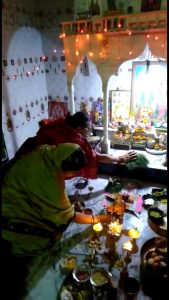Indian lore and legend is replete with stories of the unique bond between a brother and sister. There are folk tales, mythological tales, songs and poems dedicated to this bitter-sweet yet ever-lasting relationship. It is difficult to decode the feelings, emotions and love between siblings. Indian culture recognises the strength of this bond, so there are many festivals dedicated to siblings among people of different states and communities.
Bhai Bandani – this is the name by which this festival is known in Western Odisha. Sisters pray to God for the longevity, well-being and prosperity of their beloved brother. It is observed on the second lunar day of Shukla Paksha of Kartika month of the Vikram Samvat Hindu calendar. This year, it fell on Tuesday, October 29, the last day of the five-day long Diwali celebration. Women and girls who can’t observe Bhai Juntia due to family tradition, pray to Lord Yama on this day for their brother’s long life.
Legend has it that…..
after defeating the evil demon Narakasura, Lord Krishna paid a visit to his sister Subhadra, who gave him a warm welcome with sweets and flowers. She applied a tilak on Krishna’s forehead with affection. It is believed by some that this is the origin of the festival.
Another legend has it that….
on this particular day, Yama, the God of Death visited his sister, Yami. She put a tilak on her brother Yama’s forehead, garlanded him and fed him special dishes cooked by her. Since they were meeting after a long time, they dined together and talked to each other to their heart’s content. Yama then announced that whoever receives tilak from his sister on this particular day, will enjoy long life and prosperity. Based on this, Bhai Bandani is also known as Yama Dwitiya.
Cut to today….
 Nilima Mishra from Bargarh says, “We have been celebrating this festival from childhood. The rituals begin early in the morning. We make a small hut out of cow dung with idols of Yam and Yami inside. We pray Lord Yama to bless our brother with long life. Early that day, we prepare bunches of duba grass (108 strands) and a morsel of 108 rice grains for each brother. By preparing a bunch of 108 strands of duba grass, we pray for a 108-year-long life for our brother. After the traditional puja we offer that duba bunch to our brother. It is like removing the effects of the evil eye. “
Nilima Mishra from Bargarh says, “We have been celebrating this festival from childhood. The rituals begin early in the morning. We make a small hut out of cow dung with idols of Yam and Yami inside. We pray Lord Yama to bless our brother with long life. Early that day, we prepare bunches of duba grass (108 strands) and a morsel of 108 rice grains for each brother. By preparing a bunch of 108 strands of duba grass, we pray for a 108-year-long life for our brother. After the traditional puja we offer that duba bunch to our brother. It is like removing the effects of the evil eye. “
Sambalpur resident Minu Nanda adds, “According to the story in Padma Puran, Yami had invited her brother Yama for a delicious meal. We also cook and serve many a delicacy to our brother after the rituals. This festival is all about having a good time with the brother, so there is no fasting involved. After the morning rituals, it a day full of family time for us.”
Bhai Bandani is a day when brothers and sisters pamper each other. In modern times, it is a chance for siblings to spend quality time together. Traditionally, a married sister visits her brother’s house but if she cannot make it for some reason, the brother makes sure to meet his beloved sister .
The diversity of this festival is visible as it is celebrated in different parts of the country by different names but with the same essence.
1. Bhai Dooj
This is the most common name and is popular in Northern India.
2. Bhau Beej
It is celebrated in Maharashtra on the last day of Diwali.
3. Bhai Bij
It is celebrated in Gujarat as Bhai Bij. The festival marks the end of Diwali.
4. Bhatru Dwitiya
It is celebrated in South India.
5. Bhav Bij
This is what the Konkani and Goan community call their festival of siblings love.
6. Bhatri Ditya
It is known by this name in parts of Uttar Pradesh and Bihar
7. Bhai Phota
Celebrated in parts of West Bengal and Assam, it is observed on the first or second day of Kali Puja festival.
8. Bhai Tikka
In Nepal, Bhai Dooj is called Bhai Tikka and celebrated on the third day of Tihar (their name for Diwali). It is the most important festival and calls for a huge celebration.


